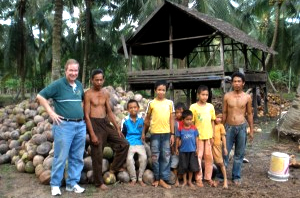On this he ekes out a subsistence-level living for his family of nine. But things are looking up for him — the poor coconut farmer.
Dr. Walter Bradley and his team of mechanical engineers at Baylor University are developing marketable uses for coconuts. During a long career at Texas A&M University, Dr. Bradley applied his expertise to improving consumer products for companies like 3M, Dow, and Dupont. When he moved to Baylor in 2002, he sensed God leading him to change his focus.
The Poorest Two Billion
“Rather than helping to make the most comfortable billion people in the world a little more comfortable,” he explains, “God wants me to help the poorest two billion people—who live on less than two dollars per day—have a better shot at survival.”
His team looked for an abundant renewable resource that grows exclusively in poor parts of the world and is owned by the poor people of those countries. A former doctoral student—the first person from Papua New Guinea to earn an engineering degree—suggested they take a look at coconuts.
“Please God, let there be something useful and interesting about coconuts,” Dr. Bradley prayed.
And there was. The coconut’s constituent parts of husk, pith, oil and shell all have properties with numerous possible consumer applications in the gardening, packaging, and building materials industries.
It Captured Their Attention
But the application that captured the attention of Motor Trend magazine, MSNBC, and the Discovery Channel is in car parts—specifically trunk liners and door panels—made by blending 50% coconut fibers with polypropylene.
“People are looking for green choices today,” Dr. Bradley notes. “Replacing polyester with coconut fiber is cheaper, greener, and has better mechanical properties. We could possibly triple the income of poor coconut farmers!”
Dr. Bradley’s group aims to work through churches and missions to help poor farmers own the coconut processing facilities, for which his group then becomes a primary customer. Developing technology with patents allows them to maintain a significant price for the coconut and pay farmers a far better price than they get today.
Yes, things are looking up for the 11 million coconut farmers of the world. All because one Christian professor asked God to show him a holistic way to help them—meeting both their spiritual and economic needs.
More on Walter’s research at the American Scientific Affiliation.


